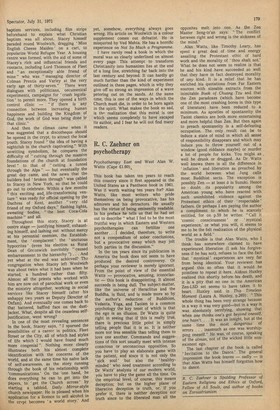R. C. Zaehner on psychotherapy
Psychotherapy East and West Alan W. Watts (Cape £1.6O)
This book has taken ten years to reach this country since it first appeared in the United States as a Pantheon book in 1961. Was it worth waiting ten years for? Alan Watts, like most writers who pride themselves on being provocative, has his admirers and his detractors. He usually has the virtue of being eminently readable. In his preface he tells us that he had set out to describe "what I feel to be the most fruitful way in which Eastern and Western psychotherapies can fertilize one another ... I decided, therefore, to write not a compendium of sober conclusions, but a provocative essay which may jolt both parties in the discussion."
In the ten years since its publication in America the book does not seem to have produced the desired controversy. Or perhaps your reviewer is merely ignorant. From the point of view of the essential Watts — provocative, amusing, iconoclastic — this book is disappointing. It almost succeeds in being dull. The subject-matter, like the universe of Heraclitus lind the Buddha, is fluid, and is made more so by the author's reduction of Buddhism, Vedanta, Yoga, and Taoism to a common psychology the key tenet of which is that the ego is an illusion. Dr Watts is quite right in seeing that if this is really true, there is precious little point in simply telling people that it is so. It is neither more nor less sensible than telling them to love one another. Commands and suggestions of this sort usually meet with intense conscious or unconscious opposition. So you have to play an elaborate game with the patient, and since it is not only the ' sick soul' but also the ' healthyminded ' who need treatment according to Dr Watts' analysis of our modern world, you have to play the game all the time. On the empirical level, of course, this means deception; but on the higher plane of liberation deception is truth, or, if you prefer it, there is neither deception nor truth since to the liberated man all the opposites melt into one. As the Zen Master Seng-ts'an says: "The conflict between right and wrong is the sickness of the mind."
Alan Watts, like Timothy Leary, has spent a great deal of time and energy assailing the Protestant ethic of hard work and the morality of 'thou shalt not.' What he does not seem to realize is that he and his kind have succeeded so well that they have in fact destroyed morality of any kind. It is a relief that he has enriched his quotations from Far Eastern sources with sizeable extracts from the inimitable Book of Chuang Tzu and that the Zen paradoxes (which have become one of the most crashing bores in this type of literature) have been reduced to a minimum. As apostles of spontaneity the Taoist classics are both more entertaining and more helpful than Zen. But then again to preach spontaneity is a self-defeating occupation. The only result can be to induce a state of mind in which all sense of responsibility disappears and which may induce you to throw yourself out of a window (good riddance maybe) or murder a lot of people for kicks. You might as .
well be drunk or drugged. As Dr Watts well knows there is all the difference in ' inflation ' and liberation as preached by the world between what Jung calls most Buddhist sects. The exception is possibly Zen — at least a la Suzuki. Hence no doubt its popularity among the American young who have reacted with such uninhibited violence against the Protestant ethics of their ' respectable ' fathers. Or perhaps I am paying the author a compliment to which he is scarcely' entitled, for on p.59 he writes: "Call it 'cosmic consciousness ' or mystical
experience,' or what you will, it seems to me to be the felt realization of the physical world as a field."
The trouble is that Alan Watts, who I think has somewhere claimed to have experienced liberation (I ask his forgive ness if he has not), refuses to face the fact that 'mystical' experiences are very far from being identical. Your reviewer has argued this so often that it would be pointless to repeat it Ihere. Aldous Huxley realized this shortly before his death, and it is a pity that no one in the American Zen-LSD set seems to have taken it to heart. Huxley said in This Timeless Moment (Laura A. Huxley, p.269): "This whole thing has been very strange because in a way it was very good—but in a way it was absolutely terrifying, showing that when one thinks one's got beyond oneself, one hasn't. . . . It was an insight, but at the same time the most dangerous of errors . . . inasmuch as one was worshipping oneself." He was, of course, speaking of the atman, not of the wicked little nonexistent ego. The last chapter of the book is called 'Invitation to the Dance.' The general impression the book leaves — sadly — is that Alan Watts has himself forgotten how to dance.
R. C. Zaehner is Spalding Professor of Eastern Religions and Ethics at Oxford, Fellow of All Souls, and author of books on Zoroastrianism










































 Previous page
Previous page